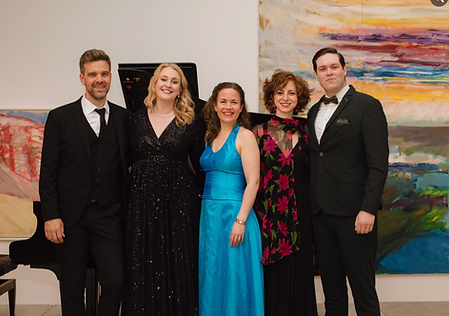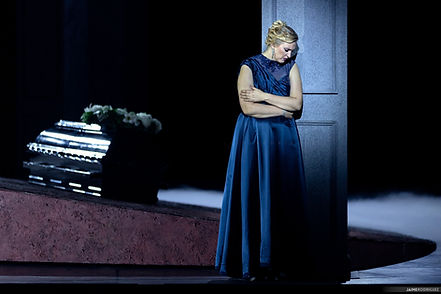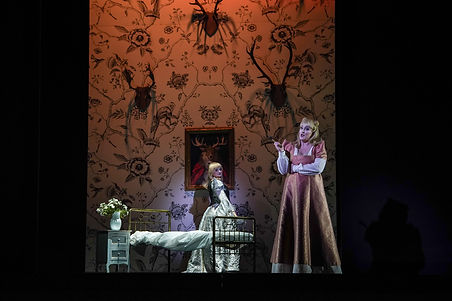Press

Carmina Burana
Konzerthaus am Schloss Kiel | Germany, 2026
he soloists were assembled with remarkable distinction and carried the performance with refined artistry. The Icelandic soprano Bryndís Guðjónsdóttir allowed her expansive soprano to shine with precision and polish, gleaming like a finely cut diamond.
Christian Strehk - Kieler Nachrichten 12.01.2026

La Bohéme - Musetta
Borgarleikhúsið | Iceland, 2025
Bryndís made Musetta utterly charming and sang her self-description with a sense of humorless self-loathing absolutely brilliantly. The scene in the tavern when she noisily gets rid of her rich lover Alcindor (Níels Thibaud) was absolutely hilarious.
Silja Aðalsteinsdóttir - Tímaritið 07.12.25

La Bohéme - Musetta
Borgarleikhúsið | Iceland, 2025
Bryndís Guðjónsdóttir sings and plays the singer Musetta, who is the character in this opera who has the most aspects, and Bryndís sang and portrayed all of them very well.
Trausti Ólafsson - RÚV 13.12.25

Le nozze di Figaro
Borgarleikhúsið | Iceland, 2025
The Countess was more of a surprise, Bryndís was exceptionally talented in the role and plucked the heartstrings beautifully, for example in the aria where she remembers past moments of pleasure with her husband.
Silja Aðalsteinsdóttir - Tímarit Máls og menningar 03.02.25

Opera gala
Hafnarborg | Iceland, 2025
"[...] The size of Bryndís's voice became strikingly clear in the aria “Klänge der Heimat” from Die Fledermaus by J. Strauss II.
Her singing here was, quite simply, outstanding, and although much of the rest of the concert was generally well performed, this rendition stood above everything else I heard at the festival this time."
Magnús Lyngdal - MBL 29.06.25

Don Giovanni - Donna Anna
Teatro de la Maestranza | Spain, 2025
Also convincing was the already familiar Bryndis Gudjönsdöttir, who after winning the Nuevas Voces de Sevilla award a few editions ago, frequently appears on local stages: her powerful and well-projected voice, easily took on the role of Donna Anna.
Juan José ROLDÁN - Ópera Actual 13.10.25

Don Giovanni - Donna Anna
Teatro de la Maestranza | Spain, 2025
Bryndís Guðjónsdóttir's Donna Ana was in very good voice from the start, also intense due to the libertine's attacks, and she attacked them all when necessary, as in 'Or sai chi l'onore', in which she was comfortable in the countless high notes.
Carlos Tarín - ABC Sevilla 13.10.25

Le nozze di Figaro
Borgarleikhúsið | Iceland, 2025
All ten singers (in different roles) were vocally good. I would like to point out Bryndísi Guðjónsdóttir (The Countess) in particular.
Her voice was very full, especially in the two big arias, they were sung wonderfully.
Magnús Lyngdal - Morgunblaðið / newspaper 06.02.25

New Years concert
Harpa Concert Hall | Iceland, 2025
Bryndís interpretation everything with sincerity and effortless high notes, so much so that the highlights of her singing were always impressive. The harmony in the duets also came out well, and it was clear that a lot of work went into it.
Jónas Sen - Vísir 15.01.25
https://www.visir.is/

Carmina Burana
Teatro de la Maestranza | Spain, 2024
Among the soloists, the Icelandic soprano Bryndís Guðjónsdóttir, well known to the Seville public since her triumph in 2022 at the New Voices Competition organised by the ASAO, was waiting for her turn, and in the end she provided some of the highlights of the evening.
[...] Guðjónsdóttir has a light soprano tessitura, with a crystalline timbre and bright, clean, brilliant high notes. She is also a superb singer, who knows how to phrase and regulate the sound flow with exquisite smoothness: after a very delicate "In trutina" she blended wonderfully with the children in "Oh, oh, oh, totus floreo" and left a superb "Dulcissime", with an impeccable and stratospheric D at the top of the demanding coloratura bow written by Orff.
Pablo J. Vayón - Diario de Seville 20.09.24
https://www.diariodesevilla.es/ocio/ross-gran-sinfonico-1-carmina-burana-critica_0_2002410934.html

Carmina Burana
Teatro de la Maestranza | Spain, 2024
But it was the winner of the New Voices Competition of Seville (2022), the Icelandic Bryndís Guðjónsdóttir, who we believe won all our esteem, since she began her singing with ease and vocal balance, without ups and downs in vocal color, with excellent diction and at the end with high notes that culminate in a feared super-high D, out of the orbit of any soprano, for which Orff allows her a small rest of a few bars before emitting it, and which the soprano took advantage of to do what seemed to be micro vocal exercises before giving it with apparent ease. We are glad of the opportunity that has been given to her in Seville.
Carlos Tarín - ABC Seville 20.09.24
https://www.abc.es/queplan/sevilla/conciertos/publico-responde-llamada-ross-20240920005438-nts.html

New Years concert
Teatro Maestranza | Seville, Spain 2024
Mein Herr Marquis, defended by the young Bryndís Gudjónsdóttir with commendable grace and self-confidence so appropriate to embody the servant Adele. [...]
A brilliant voice, with sincere and fluid phrasing and bright and generous high notes, characterized her voice, which also triumphed in Rosalinde's aria, the famous czardas of the second act of the same Straussian title, Klänge der Heimat, with which she wants to convince the concurrence
that she is a Hungarian countess, in another of the feigned
characterizations of this absolute mess comedy. Her broad voice and magnificent profile, equally pleasant timbre, captivated the audience.
[...] The fun song Glitter and Be Gay from the opera Candide by Leonard Bernstein, served once again, as a tip, to praise the comedic vision of Bryndís Gudjónsdóttir, who excelled in her intricate agility and sophisticated vocalizations.
Juan José Roldán - El Correo 04.01.23
https://www.elcorreoweb.es/cultura/la-ross-recibe-el-ano-con-bryndis-incluida-IY9045695

Der Freischütz: Ännchen
Theater Kiel | Germany, 2024
Bryndís Guðjónsdóttir from Iceland is excellently cast as the young relative Ännchen with her fresh, luminous soprano voice and great humor.
Christian Strehk - Kieler Nachrichten 09.06.24
https://www.kn-online.de/angebot/pur/?hasSeenCMP=true

Der Freischütz: Ännchen
Theater Kiel | Germany, 2024
[...]From the strong ensamble, I would like to point out Bryndís Guðjónsdóttir in the role of Ännchen.
In addition to her incredibly strong soprano voice, she was very convincing with her impressive acting.
Literature and world of culture 14.06.24

Die Zauberflöte: 1. Dame
Aalto Theater Essen | Germany, 2024
Furiously good: Judith Spiesser's "star-flaming queen", where the coloraturas are like arrowheads in the opponent's body. No wonder, given the escort: her three ladies (Bryndis Gudjonsdottir, Nataliia Kukhar and Bettina Ranch) are in no way inferior to Majesty.
Lars von der Gönna - NRZ 14.09.24

Der Freischütz: Ännchen
Theater Kiel | Germany, 2024
Another absolute plus point of this cast is Bryndís Guðjónsdóttir as Ännchen. She convinces with her unforced singing, which always shines over the orchestra. In addition, she is allowed to act a little more lively.
Marc Rohnde - Der Opernfreund 29.10.24
https://deropernfreund.de/theater-kiel/kiel-der-freischuetz

New Years concert
Teatro Maestranza | Seville, Spain 2024
Performed by Gudjonsdottir Mein Herr Marquis of the same operetta: self-confidence in her phrasing, accents full of mischief, added to the brilliance of her register and has plenty of volume. [...] Klänge der Heimat were compensated by her brilliant coloraturas.
Something that he had the opportunity to endorse with Glitter and be gay from Leonard Bernstein's opera Candide given as a tip, with brilliant vocalizations.
Andrés Moreno Mengíbar - Diario de Seville
https://www.diariodesevilla.es/ocio/Strauss-Gudjonsdottir-Macias_0_1863115188.html

Beethoven 9. Symphony
Wunderino Arena | Kiel, Germany 2024
But Carlberg doesn't allow for anything dignified when celebrating, but drives the collective into a violently radiant euphoria with constantly powerful, driving tempos. The Icelandic soprano Bryndis Guðjónsdóttir outshines this with admirable incandescence.
Christian Strehk - Kieler Nachrichten 03.01.24
https://www.kn-online.de/kultur/regional/wunderino-arena-kiel-beethovens-neunte-im-neujahrskonzert-MTBIZ5H3UFAAFCBECATUVZT2RI.html

Ad Genua by Anna Thorvaldsdóttir,
Hallgrímskirkja | Iceland 2023
[...] sounded at the concert accompanied by Iceland Symphony Orchestra string ensemble, soprano Bryndís Guðjónsdóttir and the Hallgrímskirkja Choir. Such beauty!
A rare experience: Bryndís's voice, both warm and powerful, echoed in the church in perfect harmony with the well-singing choir and her voice rhymed beautifully with the sound of the choir, clear and bright.
Arndís Björg Ásgeirsdóttir - Heimildin 13.10.23
https://heimildin.is/grein/19185/

Gli Uccellatori
Teatro Verdi | Martina Franca, Italy 2023
Among all, Bryndis Gudjónsdóttir (The Countess Armelinda) undoubtedly stands out, a dazzling Icelandic soprano, who amazes the audience with a balanced, smooth, though brilliant timbre and high notes like fireworks. She was definitely the star of the production and we will surely hear a lot about her.
Attilio Cantore - Musicpaper 08.08.23
https://www.musicpaper.it/rossini-e-gassmann-in-valle-ditria/

Candide
Wunderino Arena | Kiel, Germany 2023
The Icelandic soprano Bryndis Gudjonsdottir brilliantly fired coloratura and flares into the artificially created auditorium - not only in the famous fireworks of "Glitter And Be Gay". Her Cunegonde was both a notoriously amoral leading figure and a sympathetic heart figure.
Christian Strehk - Kieler Nachrichten - 18.06.23
https://www.kn-online.de/kultur/regional/wunderino-arena-kiel-candide-von-bernstein-in-der-loriot-fassung-YD4YASIV6RENLI3JTW6ZTTIUPI.html

Recital
Espacio Turina | Seville, Spain 2023
Icelandic soprano Bryndís Gudjónsdóttir reaffirmed the arguments that won her the first prize of the competition last November. We are dealing with a light lyric soprano possessing an unusually wide and powerful voice for her voice type, where it is normal to have voices with a narrow range. However, in the case of the Icelander, her ease in moving securely in the upper register (the shining Mi and Fa that crowned O Zittre nicht) and displaying cascades of coloratura, combined with a voice of ample volume and width in the middle, is remarkable. Purely technical issues are perfectly resolved: clear emission, precise articulation, perfect projection without any throat or nasal adherence, impeccable intonation, with clean and correct interval jumps. This was demonstrated in the most pyrotechnic pieces, such as in the aria of Mitridate or the well-known passage of Candide. Another matter is the more expressive singing, the attention to legato, the careful phrasing based on regulators, issues that only appeared somewhat in the Icelandic songs, which are more introspective.
Andrés Moreno Mengíbar from Diario de Seville
https://www.diariodesevilla.es/ocio/Gudjonsdottir-ASAO_0_1771325010.html

Recital
Espacio Turina | Seville, Spain 2023
Guðjónsdóttir guided it [O Zittre nicht] with total confidence, as if it were nothing; but in the middle, she had also given, to start, an extensive coloratura. Her high notes reverberated in the hollow and -for her- small acoustics of the Turina.
[...] The recital contained only eight numbers, almost all of them "life or death". The second one is from a rarely programmed Mozart opera, 'Mitridate, re di Ponto', and the aria 'Al destin, che la minaccia', also because, as we said above, it includes a terrible high E, prepared to make a recital sink. The Icelander sang it again without difficulty, with fullness and it even seemed to us that, in a brighter way, with less dryness (the hall is already dry, and even more so for that volume of high notes).
The Russian song 'Solovey' by Aleksandr Alyabyev, composed around 1825, was unknown. Being called 'nightingale' and with a range like Guðjónsdóttir's, we can imagine the succession of unreachable notes it presented, ending in a tremendous D.
[...]In this lyrical field, three Icelandic songs by unknown authors undoubtedly stood out, which brought out a full balance of the voice in her, rounding out the register, sweetening her color, and making us feel her full identification with this music.
Finally, she decided to close with the most well-known, lively and light piece from Bernstein's 'Candide', a "Valentine's Day card", as the composer called it, where she particularly stood out for her more relaxed interpretation, as if she had stepped out of the concert screen to sing to family and friends. Naturally, this ode to luxury and jewels, parodying the aria of the jewels from Gounod's 'Faust', had to end with a genuine pearl necklace like the three impossible E flat notes that the Icelandic soprano strung together with the precision of a Tiffany jeweler.
Carlos Tarín, ABC de Seville
https://www.abc.es/queplan/sevilla/conciertos/gran-certamen-voces-sevillano-falta-solo-publico-20230304181610-nts.html#vca=compartirrrss&vso=abc&vmc=rrss&vli=fixed-link

Recital
Salurinn Concerthall | Kópavogur, Iceland 2022
Soprano Bryndís Guðjónsdóttir started the concert with the Icelandic lieders, Kall sat undir Kletti by Jórunna Viðar, then she sang Fuglinn í fjörunni by Jón Þórarinsson and then Farfuglarnir by Elísabet Jónsdóttir.
Her interpretation was breathtaking, full of emotion, and the voice itself was bright and melodious, but at the same time very euphonious.
The same thing can be said about other songs she sang later in the program.
Jónas Sen, Fréttablaðið, Icelandic newspaper
https://jonas-sen.com/2022/10/08/draugagangur-leirburdur-og-perlur/

Die Zauberflöte
Reaktorhalle | München, Germany, 2021
[...] you have to watch out for the Cristal High notes of the Icelandic
Ice-Queen Bryndís Guðjónsdóttir and her three ladies on the Hoverboard.
Klaus Kalchschmid, Süddeutsche Zeitung, München
https://www.sueddeutsche.de/muenchen/oper-einsam-in-einer-gespaltenen-welt-1.5292464
